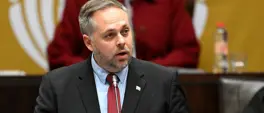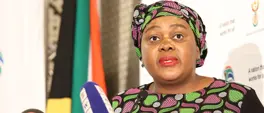UK court paves way for corruption-accused businessman Richard Payne's extradition to SA
Bernadette Wicks
28 March 2024 | 13:07Payne is an accused in the same case as former Gauteng Health MEC, Brian Hlongwa.
JOHANNESBURG - After more than a decade on the lam, graft-accused businessman Richard Payne’s extradition now looks to be imminent.
This with a court in the United Kingdom, where he’s been holed up since 2022, having given it the thumbs up.
Payne is an accused in the same case as former Gauteng Health MEC, Brian Hlongwa.
He's a central figure, with his company, 3P Consulting, and various other linked entities allegedly having scored R1.2 billion worth of contracts between 2006 and 2010 from what was then Hlongwa’s department in exchange for providing civil servants with kickbacks.
The case relates, in particular, to a contract to establish a project management unit. After it had already been awarded tenders to compile the department’s 2007/2008 budget and to develop a turnaround strategy, 3P Consulting apparently came up with the idea to establish the project management unit itself and then scooped the tender for this work as well via a consortium it was a part of. Further, the contract for the establishment of the project management unit was awarded at an initial value of R68 million a year for a two-year period but the department ended up forking out a total of over R340 million.
A Special Investigating Unit (SIU) report found Hlongwa had scored big in the form of luxury spa treatments for him and his wife, trips and a multi-million-rand deposit on a plush Bryanston home from the allegedly dodgy dealings. That same year, Hlongwa resigned from his erstwhile position as the ANC’s chief whip in the province but he has not faced any criminal consequences up until now.
Payne was out of the country when the first arrests finally took place in 2021, though, and the authorities have been working to get him back here since then.
He fled to Mauritius first in 2012, shortly after investigations into this matter kicked off; and then to the UK in 2022, shortly after the first arrests took place.
In late 2022, the Justice Department then issued an extradition request and Payne was subsequently arrested.
After he declined to consent to his extradition, though, a full extradition hearing was convened at which he put up various arguments, including that he wasn’t a fugitive and left South Africa "for a myriad of reasons but not to evade justice".
On Payne’s evidence, when he left for Mauritius it was initially for a two-week business trip but as a result of what he said were constant threats and his deteriorating mental health, he then decided to stay.
He maintains further that he then went to the UK for a combination of reasons, including his father’s 90th birthday and to explore possible relocation.
In a ruling handed down earlier this month, though, Westminster Magistrates Court found against Payne.
"His accounts for relocating from RSA to Mauritius and from Mauritius to the UK bear certain similarities – initial short-term visits, which became longer stays for unexpected reasons. The reasons he advances in each instance are, I am sure, similarly untrue," found the court.
Payne also sought to rely on an argument based on the amount of time that had passed since the alleged offences but the court found he had "not established that there is missing evidence such as would prejudice the conduct of his trial or make it unjust to extradite him" not that “lost witnesses and/or faded memories exist such as to render extradition unjust".
He further labelled the case against him an abuse of process and honed in on prison conditions in South Africa, which he argued put at risk his rights in terms of the European Convention of Human Rights not to be subjected to inhuman or degrading treatment or punishment as well as to respect for private and family life, home and correspondence.
The court, however, found against him on all these points too.
The matter has now been referred to the Secretary of State to make the final call, which he has two months to do.
In terms of UK legislation, he, however, now has to order Payne’s extradition unless it’s prohibited by certain statutory provisions.
But these provisions focus on, for example, if he risks the death penalty or has already been extradited to the UK from somewhere else and don’t appear, on the face of it at least, to apply in this matter.
Get the whole picture 💡
Take a look at the topic timeline for all related articles.













